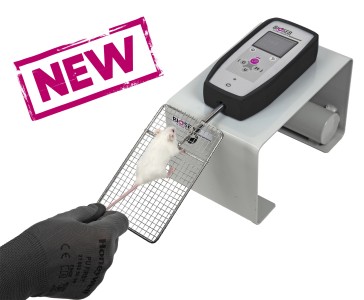Authors
D Nieoczym, K Soca_a, K Gawel, CV Esguerra
Lab
Department of Animal Physiology, Institute of Biology and Biochemistry, Maria Curie-Sk_odowska University, Lublin, Poland
Journal
Neurochemical Research
Abstract
Pterostilbene (PTE), a natural dimethylated analog of resveratrol, possesses numerous health-beneficial properties. The ability of PTE to cross the blood–brain barrier raised the possibility that this compound may modulate central nervous system functions, including seizure activity. The aim of our study was to investigate the activity of PTE in the larval zebrafish pentylenetetrazole (PTZ) seizure assay and three acute seizure tests in mice, i.e., in the maximal electroshock seizure threshold (MEST), 6 Hz-induced psychomotor seizure threshold and intravenous (iv) PTZ tests. Additionally, potential antidepressant activity of PTE was estimated in the forced swim test in mice. The chimney test was used to determine the influence of PTE on motor coordination in mice, while its influence on neuromuscular strength was assessed in the grip strength test in mice. Locomotor activity was determined to verify the results from the forced swim test. PTE revealed an evident anticonvulsant effect both in zebrafish larvae (10 µM; 2 h-incubation) and mice (at doses of 100 and 200 mg/kg, intraperitoneally) but it did not exhibit antidepressant potential in the forced swim test. Furthermore, it did not cause any statistically significant changes in motor coordination, neuromuscular strength and locomotor activity in mice. In conclusion, our present findings demonstrate for the first time the anticonvulsant potential of PTE. The aforementioned results suggest that it might be employed in epilepsy treatment, however, further precise studies are required to verify its activity in other experimental seizure and epilepsy models and its precise mechanism of action should be determined.
BIOSEB Instruments Used
Grip strength test (BIO-GS3)
Source :
https://link.springer.com/article/10.1007/s11064-019-02735-2

 Pain - Thermal Allodynia / Hyperalgesia
Pain - Thermal Allodynia / Hyperalgesia Pain - Spontaneous Pain - Postural Deficit
Pain - Spontaneous Pain - Postural Deficit Pain - Mechanical Allodynia / Hyperalgesia
Pain - Mechanical Allodynia / Hyperalgesia Learning/Memory - Attention - Addiction
Learning/Memory - Attention - Addiction Physiology & Respiratory Research
Physiology & Respiratory Research











![Dynamic Weight Bearing 2.0 – Postural Module [Add-on]](https://bioseb.com/733-home_default/dynamic-weight-bearing-20-add-on-postural-module.jpg)
























 Pain
Pain Central Nervous System (CNS)
Central Nervous System (CNS) Neurodegeneration
Neurodegeneration Sensory system
Sensory system Motor control
Motor control Mood Disorders
Mood Disorders Other disorders
Other disorders Muscular system
Muscular system Joints
Joints Metabolism
Metabolism Cross-disciplinary subjects
Cross-disciplinary subjects CONFERENCES & MEETINGS
CONFERENCES & MEETINGS 